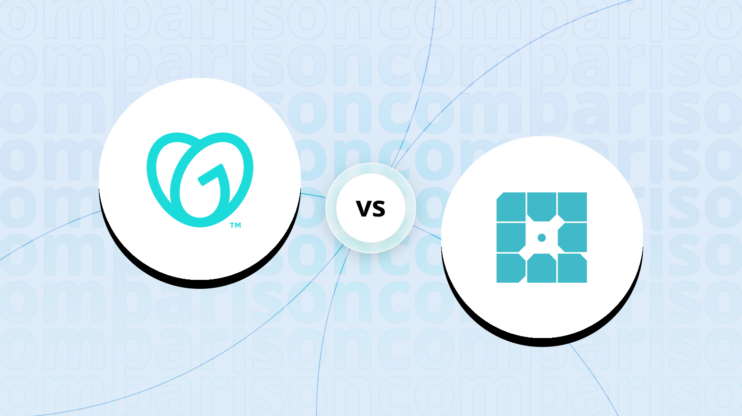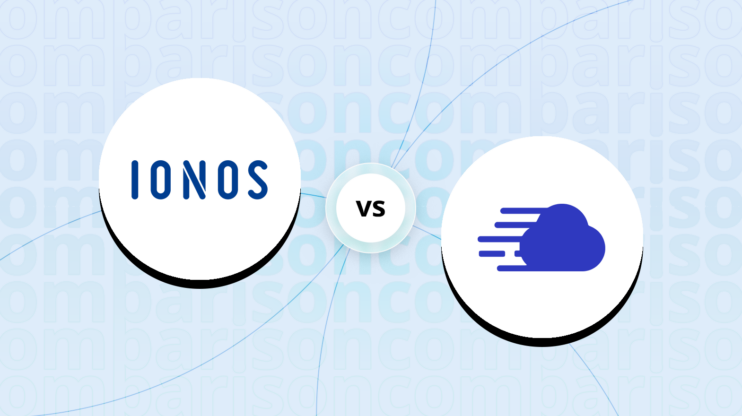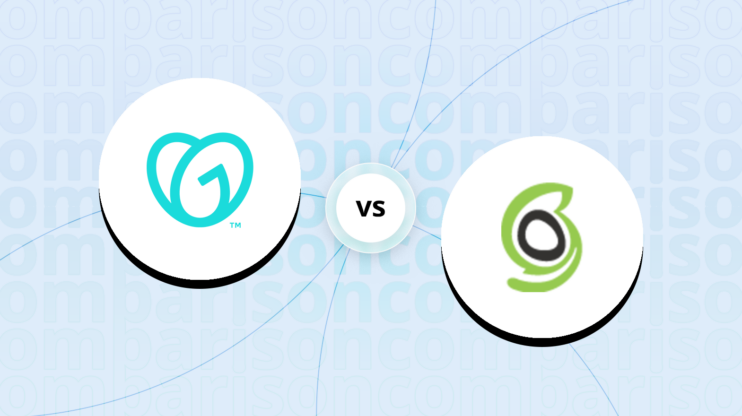Dreamhost vs Inmotion Hosting: Final verdict
Looking over DreamHost vs. InMotion Hosting, both have their strong points catering to different user preferences.
InMotion Hosting (Overall grade: 8.4)
provides robust performance with high-speed NVMe SSD storage, unlimited bandwidth, and secure FTP/SSH access, making it a prime choice for tech-savvy users and developers. The cPanel interface ensures easy management and has advanced features for web applications. InMotion excels in customer support, offering 24/7 availability through phone, live chat, and email, combined with comprehensive security measures like hack and malware protection. However, the higher prices for premium features and occasional long waits for support draw some criticism.
DreamHost (Overall grade: 8.2)
is well-regarded for its reliability, affordability, user-friendly interface, and excellent performance. They offer an array of hosting plans, including shared, VPS, dedicated, and cloud hosting, catering to beginners and small business owners. The standout features include a 100% uptime guarantee, responsive customer support, and ease of navigation. That said, the lack of phone support and occasional slow response times from customer service can be drawbacks. For users prioritizing accessible and budget-friendly hosting options, DreamHost provides a compelling experience.
 Overall grade:8.2 |
 Overall grade:8.4 |
|
|---|---|---|
| Uptime and Availability | 8.5 | 8.2 |
| Hosting Performance | 7.8 | 8.3 |
| Hosting Security | 7.8 | 8.7 |
| Price | 8.2 | 7.9 |
| Hosting Features | 7.9 | 8.2 |
| Ease Of Setup | 8.9 | 8.6 |
| User Management | 8.1 | 8.7 |
| Customer Support | 8.3 | 8.3 |
| User feedback | 4/5 | 3.9/5 |
Hosting types offered
Both platforms provide a variety of hosting types, each designed to meet the different needs of users.
 |
 |
|
|---|---|---|
| Shared hosting | ||
| Cloud hosting | ||
| WordPress hosting | ||
| Ecommerce hosting | ||
| VPS hosting | ||
| Dedicated hosting |
Although both offer a variety of hosting plans tailored to different needs, in
certain cases, one platform may prove to be more suitable.
Detailed comparison
Uptime and availability
Evaluates the average uptime statistics, uptime guarantee and overall availability of the hosting
provider
Score Components:
- Uptime percentage (30%): evaluates the uptime statistics in given period of time
- Uptime guarantee (20%): Assesses if the platform offers an uptime guarantee and
whether the actual uptime matches the promised guarantee. - General performance (25%): Evaluates how fast is the average response time and overall
it’s stability. - Responsiveness (10%): Adaptability to different devices and screen sizes.
- Availability (25%): Reflects the total downtime and number of outages.
 8.5
8.5
 8.2
8.2
Winner DreamHost: DreamHost offers unparalleled uptime with a 100% guarantee, ensuring maximum website availability.

DreamHost stands out for its commitment to uptime and availability. Their 100% uptime guarantee, coupled with compensation for downtime, sets a high standard. The performance metrics from various tests show DreamHost maintaining strong consistency, even under stress testing scenarios. With an average response time below 300ms and proven reliability, DreamHost delivers on its promise of fast, dependable hosting.

InMotion Hosting offers competitive uptime claims across various plans, especially noticeable in their Managed WordPress Hosting. Historical data shows improvement over the years, reaching 100% in 2022. This performance signifies steady service reliability. However, the lack of explicit or consistent uptime guarantees across all plans leaves some uncertainty compared to the comprehensive commitment by DreamHost.
Which one has better hosting performance?
Score Components:
- Hosting speed (30%): This includes SSD quality, Load times, PageSpeed score ranges,
additional information on website speed, built-in plugins for performance enhancement, available caching
methods, and CPU/RAM options - CDN (20%): Considers whether CDN is available or not, whether it’s free or paid, and
the quality of the CDN service - Available data centers (30%): Evaluates the number of data centers and their locations
globally. - Scalibility (20%): Looks at whether elastic scaling is available, the process required
to scale (manual upgrade vs. automatic scaling), the presence of dedicated servers, and the costs
associated with scaling.
 7.8
7.8
 8.3
8.3
🏆 Winner InMotion Hosting: Offers faster website speeds and better customer support features.
Both DreamHost and InMotion Hosting provide commendable performance features, but InMotion holds an edge in overall speed and customer support. DreamHost boasts of high-performance cloud resources, SSD storage that enhances file transfers by 200%, and in-built server-level caching. Likewise, InMotion leverages UltraStack technology, NVMe SSD storage, and advanced caching to deliver up to 20x faster speeds. InMotion’s multiple data centers in the USA and Europe ensure low latency and reliability, compared to DreamHost’s multi-location data centers. Both offer free SSL certificates and DDoS protection for security.
Website Speed
Website speed is crucial, and InMotion outpaces DreamHost with its technological stack. DreamHost’s NGINX hosting and SSD storage provide substantial performance improvements, while InMotion’s UltraStack technology and NVMe SSD storage claim to offer website speeds up to 20x faster. Additionally, InMotion incorporates object caching for quicker load times. This places InMotion ahead in delivering a more consistent high-speed user experience, even during peak traffic.
Scalability
In terms of scalability, both hosts offer different strengths. DreamHost provides expandable RAM and storage, uncapped bandwidth, and a variety of plans, including dedicated servers starting at $199.00 per month. DreamHost allows easy plan upgrades as your site grows. InMotion also offers versatile plans from shared to dedicated hosting, but the exact cost of scaling depends on specific resource needs and starts at $35.00 per month for dedicated servers. Both hosts support elastic scaling, but automated upgrades are not clearly specified.
Which one has better security features?
and regulatory requirements
Score Components:
- Technical security measures (40%): This includes encryption, firewalls, DDoS
protection, secure configurations, server monitoring, access control and availability of security addons
(e.g Sitelock security). - Operational security measures (30%): Encompasses data privacy, backups and data
redundancy. - Compliance and certifications (20%): Adherence to legal and regulatory requirements
(e.g., GDPR, HIPAA) and possession of certifications (e.g., ISO 27001, SOC 2). - Business and reliability (10%): Factors in the provider’s reputation, uptime
guarantees, and customer support.
 7.8
7.8
 8.7
8.7
🏆 Winner
InMotion Hosting: InMotion Hosting stands out due to its extensive security features and comprehensive compliance measures.
Both DreamHost and InMotion Hosting, have notable differences in their approaches to technical and operational
security, as well as in their compliance with regulations.
Technical security measures:
DreamHost and InMotion Hosting both offer robust technical security measures, but there are some key differences. DreamHost provides free SSL certificates through Let’s Encrypt, and customers can also purchase professionally-signed certificates or use third-party SSL certificates. In contrast, InMotion Hosting includes free SSL certificates with all plans and offers dedicated IP addresses for enhanced security. Both providers support PHP 8, but DreamHost also includes OPcache for improved performance. DreamHost offers DDoS protection and a malware scanning service called DreamShield. On the other hand, InMotion Hosting uses Corero’s DDoS protection and includes automatic malware detection and scanning.
Operational security measures:
When it comes to operational security, DreamHost offers a variety of security features such as multi-factor authentication (MFA), Secure Shell (SSH) access, and SFTP for secure file transfers. They also provide password protection for directories and RAID 1 storage for increased reliability. InMotion Hosting also provides SSH access and has additional security measures like Modsec Firewall and automatic backups to redundant off-server storage clusters. Both providers offer 24/7/365 expert support, but DreamHost has its custom control panel for managing various aspects of the hosting environment.
Compliance and certifications:
DreamHost is GDPR compliant and applies GDPR regulations to its entire user base. They also ensure PCI compliance for their own sites and servers, although customers must obtain their own PCI certification for processing credit card information. InMotion Hosting complies with GDPR for EU residents, provides guidance on PCI compliance, and also adheres to CCPA, the Digital Millennium Copyright Act (DMCA), trademark violations, and doxxing violation notices. DreamHost is not HIPAA compliant, whereas HIPAA compliance for InMotion Hosting is not specified.
 |
 |
|
|---|---|---|
SSL Certificates |
Free SSL, professionally-signed |
Free SSL, dedicated IP addresses available |
Additional Security Features |
MFA, DreamShield, DDoS protection |
Modsec Firewall, automatic backups, DDoS protection |
PHP Versions |
PHP 8 with OPcache support |
PHP 7 and PHP 8 |
GDPR Compliance |
Yes |
Yes |
HIPAA Compliance |
Not HIPAA compliant |
Not specified |
PCI Compliance |
For DreamHost servers only |
Guidance and recommendation for VPS/Dedicated servers |
Hosting features
Score Components:
- Domains (20%): Assesses the availability of a free domain, domain purchase options, and
pricing - Email (15%): Considers if the provider offers full email hosting, or is reselling
third-party service, and if the email is only transactional or not - Website builder (15%): Checks if website builder is available, and it’s user
friendliness and overall the level of customization allowed. - Staging environment (20%): Determines if a staging environment is available, allowing
for testing changes before going live. - FTP & SFTP accounts (10%): Evaluates if and how easily users can access FTP and
SFTP accounts - Git and SSH access (20%): Assess whether Git is integrated into the hosting service and
if SSH access is provided
 7.9
7.9
 8.2
8.2
🏆 Winner InMotion Hosting: Reliable performance and robust security features.
When comparing DreamHost and InMotion Hosting, each has unique advantages that cater to different user preferences. DreamHost offers a variety of hosting plans, including shared, managed WordPress, VPS, dedicated, and cloud hosting. Their plans include compelling features like unlimited storage, free domain registration, and automated backups, which are especially beneficial for beginners and small business owners. DreamHost excels in offering a user-friendly approach with instant WordPress setup and automated updates, making it easier for users without technical expertise to manage their websites. Their professional email addresses, 100% uptime guarantee, and fast solid-state storage add significant value to their plans.
On the other hand, InMotion Hosting boasts high-performing NVMe SSD storage, unlimited bandwidth, and secure FTP/SSH access, making it a strong choice for developers and more advanced users. InMotion provides a user-friendly cPanel interface and a Softaculous Application Installer for easy management and installation of web applications. They offer comprehensive security features, including hack and malware protection along with DDoS prevention, catering to users with security as a priority. Additionally, InMotion’s multiple data centers in the USA and Europe enhance website performance and redundancy. Their support for various developer tools like GIT version control, Python, Node.js, and Ruby offers more flexibility for professionals looking for enhanced customization capabilities.
 |
 |
|
|---|---|---|
| Free domain | Yes | Yes |
| Free SSL | Yes | Yes |
| Email hosting | Yes | Yes |
| Website builder | Yes, instant WordPress setup | No |
| Staging environment | Yes, 1-click staging | No |
| FTP & SFTP accounts | Yes, includes SSH | Yes, includes SSH |
| Git and SSH access | Yes | Yes |
| Free backup | Yes | Yes |
| Money back guarantee | Yes | Yes |
a location. As a result in rare cases the features mentioned here can differ from the ones you see on their websites.
Both providers support a range of users from beginners to experts with user-friendly website builders and WordPress staging areas. However, in terms of developer tools, both DreamHost and InMotion Hosting offer robust options including SSH access, support for multiple programming languages, and Git for version control, thus appealing to developers looking for advanced capabilities.
Email services:
DreamHost and InMotion Hosting both offer comprehensive email hosting services, allowing users to create and manage professional email addresses. DreamHost provides professional email addresses with their shared plans, while InMotion Hosting includes email creation and management across their offerings without additional cost. Both services support transactional emails, but limits or specifics were not detailed in the given information. Neither provider mentioned reselling third-party email services like Google Workspace or Zoho.
Price
Score Components:
- Plan value (40%): What each pricing tier offers.
- Transparency and clarity (30%): Clearness of pricing structures.
- Flexibility of plans (20%): Range of options to suit different budgets.
- Hidden costs (10%): Additional expenses not included in the plan.
 8.2
8.2
 7.9
7.9
🏆 Winner DreamHost: Exceptional variety and feature-rich plans for diverse hosting needs.
Evaluating the pricing of plans among various hosting providers can be complex due to their differing pricing and renewal strategies. Additionally, certain plans require annual commitments, which adds to the difficulty of making comparisons. The prices listed are based on monthly commitments; plans requiring annual commitments are indicated. Additionally, although some providers offer identical plans for WordPress and shared hosting, we have created separate tables for each to enhance clarity.
DreamHost and InMotion offer a wide array of hosting plans with varying features and price points. DreamHost provides cost-effective shared hosting starting at $2.59/mo for new accounts, while InMotion’s shared option begins at $12.99/mo. For WordPress hosting, DreamHost’s DreamPress starts at $16.95/mo, contrasted with InMotion’s $3.69/mo entry-level plan. DreamHost’s VPS plans start at $10.00/mo, offering extensive storage and bandwidth, whereas InMotion’s equivalent begins at $14.99/mo with a focus on reliability and security. For enterprises, DreamHost’s dedicated plans start at $199.00/mo, featuring robust specifications and premium support, while InMotion provides more affordable entry points starting at $35.00/mo, though with less storage and bandwidth.
 |
 |
|---|---|
|
DreamPress $19.99
Host one WordPress website, 30GB SSD storage, Unmetered bandwidth, 24/7 WordPress specialized support, Free domain & SSL, Built-in caching, Automated & on-demand backups. Value for price:8.5
|
$3.69 /mo plan
Free domain & SSL, Free website builder, Premium themes & plugins, Advanced caching, Unlimited email addresses, Free migration tools, Unlimited professional email, Hosting Plus. Value for price:8.0
|
|
DreamPress Plus $34.99
Host one WordPress website, 60GB SSD storage, Unmetered bandwidth, 24/7 WordPress specialized support, Free domain & SSL, Built-in caching, Automated & on-demand backups. Value for price:8.5
|
$13.49 /mo plan
Similar to the $3.69 /mo plan with additional features for higher performance. Value for price:7.5
|
|
DreamPress Pro $89.99
Host one WordPress Website, 120GB SSD storage, Unmetered bandwidth, 24/7 WordPress specialized support, Priority support, Free domain & SSL, Built-in caching, Automated & on-demand backups. Value for price:9.0
|
N/A
Value for price:N/A
|
 |
 |
|---|---|
|
Shared Starter $5.99
Host one website, Unlimited storage, Free domain & SSL, Automated daily backups, 24/7 support. Value for price:8.0
|
Web Hosting $12.99
Fast, secure & reliable, Free domain & SSL, Website builder, Premium themes & plugins, Advanced caching, Unlimited email addresses. Value for price:7.5
|
|
Shared Unlimited $10.99
Host unlimited websites, Unlimited storage, Free domain & SSL, Email hosting, Automated daily backups, 24/7 support. Value for price:8.5
|
Core $3.19
Free SSL, Two websites, 100GB SSD, Unlimited bandwidth, 10 email addresses, Security suite, Automated backups, Monarx Security, Marketing tools. Value for price:8.5
|
|
N/A
Value for price:N/A
|
Launch $4.99
Free domain & SSL, 25 websites, Unlimited NVMe SSD, Unlimited bandwidth, Unlimited email addresses, 6x UltraStack performance, Security suite, Automated backups, Marketing tools, Advanced caching. Value for price:8.0
|
 |
 |
|---|---|
|
DreamCompute $10.00
Scalable cloud computing, Root access, SSD storage, Blazing-fast networking, Open APIs through OpenStack, 24/7 support. Value for price:7.5
|
N/A
Value for price:N/A
|
|
DreamObjects
Varies based on usage: Cost-effective cloud storage, Compatible with Amazon S3 API, Unlimited subdomains, Free WHOIS, Auto-renewals, 24/7 support. Value for price:7.5
|
N/A
Value for price:N/A
|
Enterprise plans
DreamHost provides dedicated hosting plans with robust specifications, starting at $199.00/mo for the Standard 16, featuring a 6-Core CPU, 16GB RAM, and 480GB SSD storage. These plans offer high performance, uncapped bandwidth, and full root access, with a 100% uptime guarantee. InMotion’s dedicated plans start at $35.00/mo, offering configurable servers, redundant infrastructure, and managed or unmanaged options, though these feature sets are generally not as extensive as DreamHost’s higher-end plans.
Dreamhost vs Inmotion Hosting: Ease of setup
platform.
Score Components:
- Site migration (25%): Assesses whether the provider offers tools for site migration,
either automated or manual, and whether these services are free or require a fee. - Admin panel usability (35%): Evaluates the type of admin panel provided, such as the
standard cPanel or a custom solution, focusing on its accessibility and user-friendliness for both
technical and non-technical users. - Setup features (20%): Examines the availability and ease of use of various setup
features, including FTP accounts, file managers, email account setup, PHPMyAdmin, and easy CDN
configuration. - Help center quality (20%): Measures the quality and accessibility of the provider’s
help center resources, including articles and tutorials.
 8.9
8.9
 8.6
8.6
🏆 Winner DreamHost: DreamHost offers an intuitive setup process and extensive support resources.
DreamHost provides a custom-built control panel for its users. This control panel is designed to offer easy-to-use features that cater to both technical and non-technical users. The interface is straightforward with advanced tools such as SFTP, Shell Access, and WP-CLI for more experienced users. DreamHost also allows for simple WordPress installation, either pre-installed with some plans or via a one-click installation process. Overall, the focus is on user convenience, making it less intimidating for beginners while still offering depth for more advanced users.
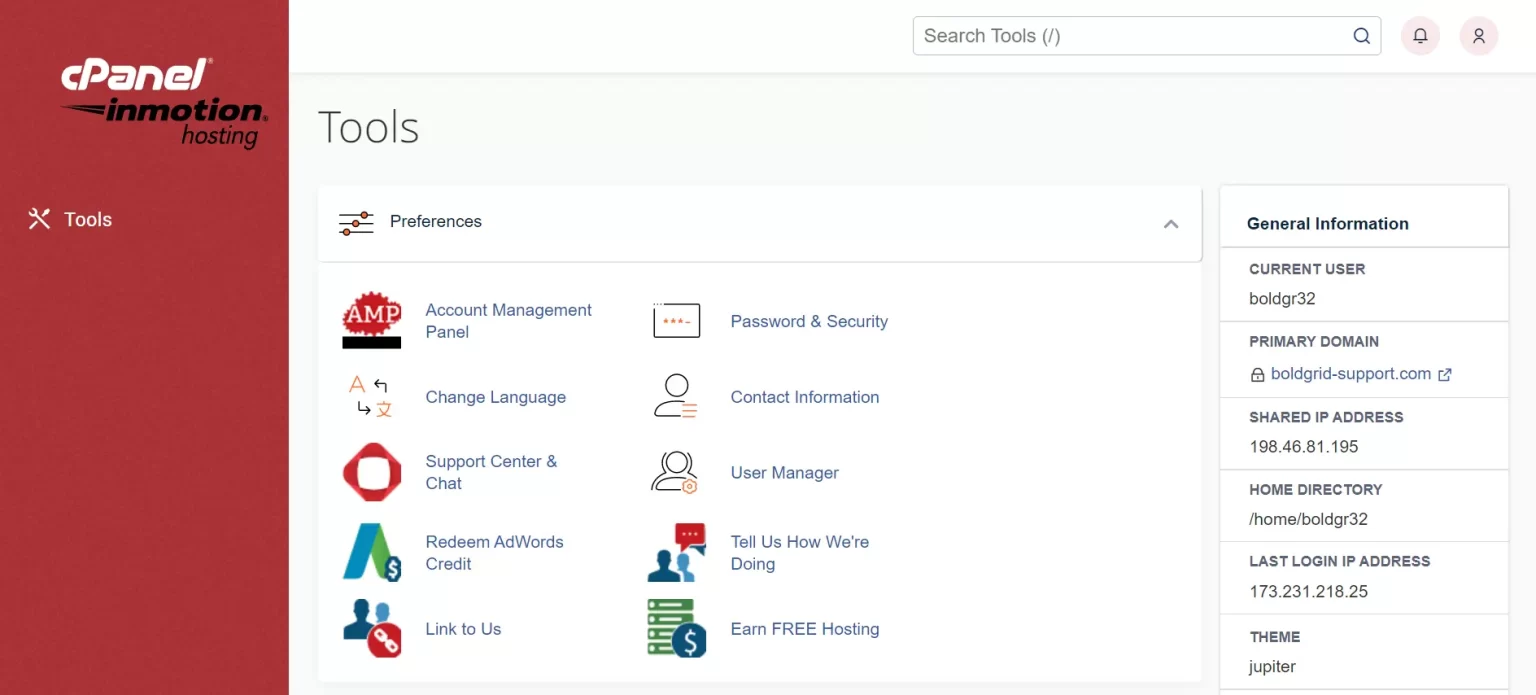
InMotion Hosting, on the other hand, utilizes the widely recognized cPanel. This offers a familiar interface for those who have used web hosting services before. The cPanel is known for its robust features and ease of use, providing one-click installations for popular web applications and frameworks. The cPanel also includes a demo for users to get acquainted with the interface before they start. While it may come across as slightly more complex than DreamHost’s custom panel, cPanel is still user-friendly and well-documented, making it accessible for users with varying levels of technical expertise.
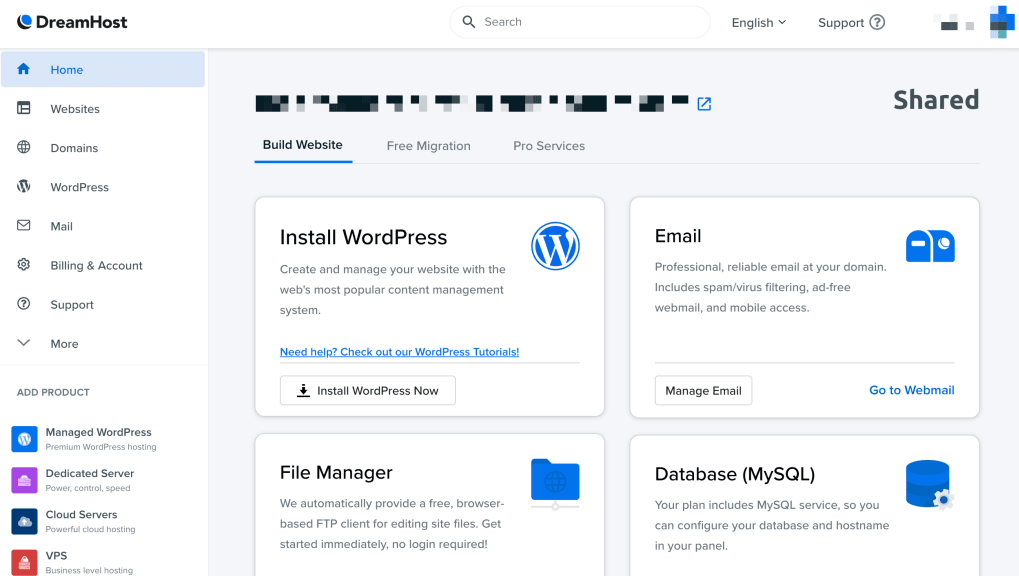
Both DreamHost and InMotion Hosting offer tools to facilitate site migration. DreamHost has a Migration Dashboard that scans your site and presents various migration options, guided entirely within their interface. This service is highly automated and straightforward, reducing user involvement to a minimum. After migration, users only need to point their DNS to DreamHost to make their site publicly accessible. InMotion Hosting offers free automated migration tools through a cPanel backup, ensuring no downtime during the process. For more complex transfers, InMotion’s Launch Assist service can handle file and database transfers to the new hosting account. Both hosting providers offer free migration tools, ensuring a seamless transition for users switching to their platforms.
DreamHost provides a plethora of resources and support options through their knowledge base and help center. They offer 24/7/365 support through chat and email, along with in-house, U.S.-based experts trained extensively, including WordPress core contributors. The knowledge base is a massive, searchable archive filled with FAQs and detailed tutorials, constantly updated to address user queries. On the other hand, InMotion Hosting also offers 24/7 customer support via live chat, ticketing, and phone support. Their online support center includes step-by-step education channels and community support forums, along with WordPress tutorials. Both providers offer comprehensive guidance and resources for their users, making them reliable for ongoing support.
User management
accessibility.
Score Components:
- Role customization (40%): Flexibility in creating and defining user roles and
permissions. - Ease of management (30%): User interface and tools for managing users.
- Access control (20%): Effectiveness of access control measures for different user
levels. - Scalability (10%): Ability to manage a growing number of users efficiently.
 8.1
8.1
 8.7
8.7
🏆 Winner
InMotion: A comprehensive platform with excellent user role management and customization options.
DreamHost and InMotion present different strengths in managing user roles, permissions, and accessibility. DreamHost offers features like unlimited SFTP users, SSH access, and an intuitive custom control panel, providing a secure environment with a variety of management options. In contrast, InMotion focuses heavily on WordPress user roles, allowing for fine-tuned role creation and management through tools like the User Role Editor Plugin and WP-CLI. This makes InMotion particularly flexible for WordPress sites, enabling detailed user engagement levels and responsibilities.
DreamHost’s user interface provides a custom-built control panel that includes tools for managing domains, email, FTP, SSH, and support. This control panel is designed to be user-friendly, accommodating both novice and expert users. InMotion, on the other hand, emphasizes the ease of managing WordPress-related tasks through the User Role Editor Plugin and WP-CLI, allowing for a streamlined user management experience directly within WordPress. Each platform caters to its specific type of user needs efficiently.
When it comes to access control measures and managing a growing number of users, DreamHost offers various features like password protection, crontab access, and access to raw log files. These options ensure secure and efficient task automation and troubleshooting. InMotion excels in its ability to manage WordPress user permissions and roles in a scalable way, making it suitable for websites that rely heavily on varied user interactions and role-specific permissions.
DreamHost user roles table:
| Role | Description | Access highlights |
|---|---|---|
| Unlimited SFTP Users | Multiple users access data via secure SFTP logins | Secure file transfers, individual user logins |
| SSH Users | Secure remote command-line server access | Remote management and command execution |
| Email Accounts | Professional email services with extensive features | 25GB storage, spam/virus filters, mobile & desktop sync |
InMotion user roles table:
| Role | Description | Access highlights |
|---|---|---|
| Administrator | Full access to all admin features | Manage site settings, themes, plugins, user roles |
| Editor | Publishes and manages posts including others’ posts | Manage posts, pages, comments |
| Author | Publishes and manages own posts | Create and edit own posts |
| Contributor | Writes and manages own posts but cannot publish | Submit posts for review, edit own posts |
| Subscriber | Manages personal profile | Read posts, comment on posts, receive newsletters |
Customer support
hosting provider.
Score Components:
- Support communication channels (30%): Measures the variety of customer support types
provided (live chat, chatbot, email, phone, etc.) - Availability (20%): Assesses the availability hours for each channel, including 24/7
support options. - Technical support quality (30%): Assesses whether the provider offers comprehensive
technical support, including hardware upgrades (e.g., HDD to SSD), software installations, and web
server configuration changes. - Enterprise support (20%): Checks if there are dedicated or priority support services
for enterprise-level customers.
 8.3
8.3
 8.3
8.3
🏆 Winner DreamHost: DreamHost stands out with a longer money-back guarantee and professional services.
 |
 |
|
|---|---|---|
Phone support |
||
Live chat support |
||
Chatbot |
||
Email/ticket support |
||
Enterprise support (dedicated agent, priority support) |
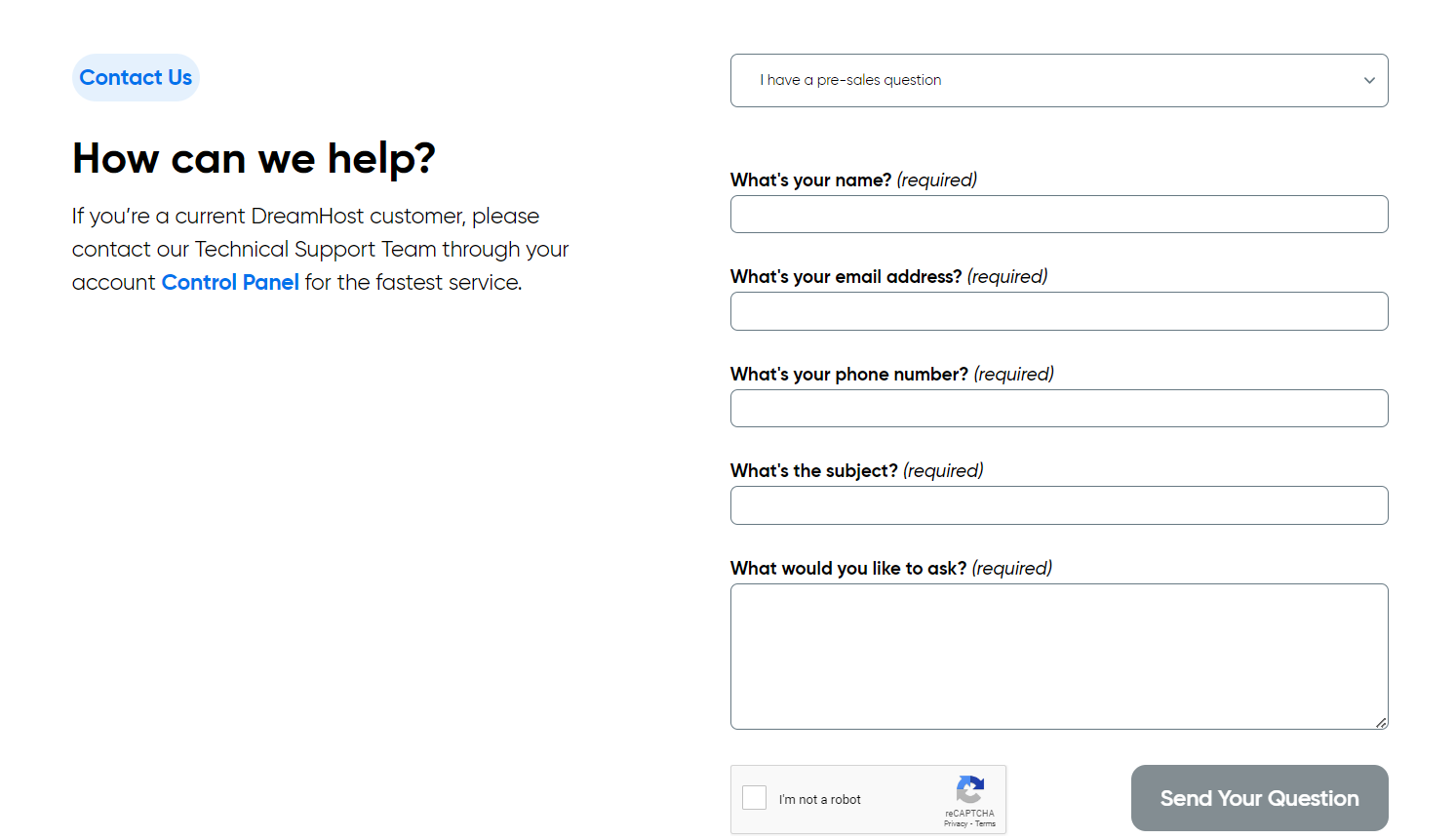
DreamHost and InMotion Hosting both offer extensive customer support to ensure their users get the help they need. DreamHost provides support through 24/7 chat, email, and a ticket system. They also offer callbacks for an additional fee but lack direct phone support. Their knowledge base is extensive, but forums were discontinued in 2022. DreamHost supports both English and Spanish, and response times are generally quick. They also offer professional services for web design, marketing, and management at extra costs.
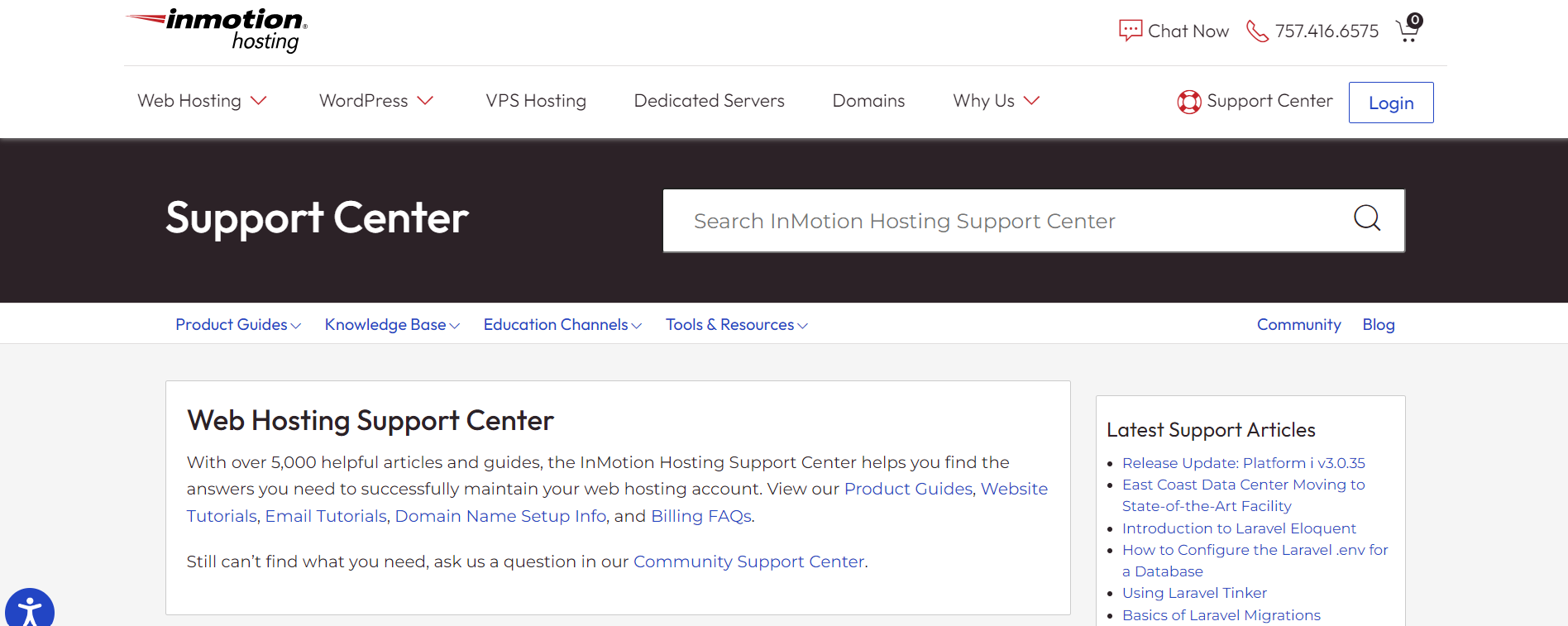
On the other hand, InMotion Hosting offers 24/7 support via phone, live chat, email, and their online support center. Unlike DreamHost, phone support is available, though callback hours are limited to weekdays. InMotion Hosting offers an extensive knowledge base and step-by-step educational channels, along with managed hosting and website transfers. Their support is highly praised for being responsive and helpful, with some minor complaints about sales representative behavior and ticket response times. With fewer limitations on direct communication methods, InMotion Hosting ensures a wide range of support options to cater to various customer needs.
Dreamhost vs Inmotion Hosting: User feedback
DreamHost is a well-regarded hosting provider praised for its reliability, affordable pricing, user-friendly interface, and excellent performance. Users especially appreciate the responsive customer support, the easy navigation of the web portal, and a variety of hosting options suitable for different needs. However, common criticisms include the lack of phone support, occasional slow response times from customer service, and some challenges related to advanced functionalities and site migrations. While the majority of users report positive experiences, a few have faced significant issues with downtime and customer service, impacting their overall satisfaction.
InMotion Hosting receives mixed reviews from users, highlighting several strengths and weaknesses. Customers appreciate the variety of hosting plans, transparent pricing, robust uptime, and exceptional customer support. On the downside, some users experience slow servers on lower-tier plans and encounter long waiting times for customer support. Additionally, the platform’s user interface has received criticism for being somewhat difficult to navigate, and there are concerns about service outages and higher prices for premium features.
Dreamhost vs Inmotion Hosting: FAQ
Which platform is better suited for hosting WordPress websites?
Both DreamHost and InMotion Hosting are well-suited for hosting WordPress websites. They offer optimized solutions with pre-installed WordPress, caching, and automatic updates. However, DreamHost’s DreamPress plans are tailored specifically for WordPress, giving it a slight edge. Ultimately, either platform would serve WordPress users effectively.
Which hosting service offers better security features?
InMotion Hosting stands out for its extensive security offerings, including Corero’s DDoS protection, automatic malware detection, and dedicated IP addresses for enhanced security. DreamHost also offers robust security measures like free SSL certificates, OPcache support, and DreamShield malware scanning but lacks some of the advanced features InMotion provides. Therefore, InMotion edges out due to its comprehensive security features.
Which platform offers better customer support?
InMotion Hosting offers superior customer support with 24/7 availability through phone, live chat, and email, alongside managed hosting and website transfers. DreamHost provides 24/7 chat and email support but lacks direct phone support and has had occasional slow response times. Overall, InMotion’s customer support is more accessible and comprehensive.
What are the major differences in pricing and value between DreamHost and InMotion?
DreamHost offers more affordable entry-level options with shared hosting starting at $2.59/mo and VPS plans at $10.00/mo, focusing on affordability and value for small businesses and beginners. InMotion’s plans start at higher price points but include premium features like NVMe SSD storage and advanced caching. While DreamHost provides cost-effective plans with essential features, InMotion caters to users willing to pay extra for higher performance and reliability.
Which hosting service offers more scalability options for growing websites?
Both DreamHost and InMotion Hosting provide scalable options from shared to dedicated hosting. DreamHost offers expandable RAM and storage, uncapped bandwidth, and a variety of plans, including cloud hosting starting at $10.00 per month for easy scaling. InMotion also allows for resource upgrades across various plans, but the cost of scaling starts at $35.00 per month for dedicated servers. Both hosts support elastic scaling, though DreamHost’s offerings are more direct.
The making of this blog
We followed a clear, step-by-step process to write and research this article.









